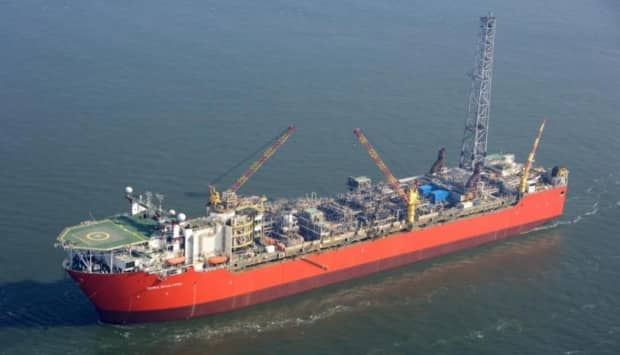Fate of Terra Nova oilfield reaches deadline, with decision expected today

On the heels of emergency debates, workers' protests and days of increasing tension and uncertainty, the fate of the Terra Nova oilfield in Newfoundland's offshore could be determined today.
Suncor Energy, the lead oil company for the project, is expected to announce whether it will continue on with the oilfield — which hasn't produced crude since late 2019 — or pull the plug entirely.
Suncor did not respond to CBC inquires on when an announcement would be made, and provincial government officials have also indicated there's no clear timeline for a response.
Last week, the provincial government turned down a 15 per cent ownership stake in Terra Nova, punting a decision on its future back to the consortium of companies that run it. The oilfield needs about $600 million in upgrades to its infrastructure, both above and below the surface of the North Atlantic.
On Monday during an emergency debate at the House of Assembly in St. John's, cabinet ministers and Premier Andrew Furey again defended rejecting that deal, calling Terra Nova too risky an expense when 85 per cent of the oil has already been removed. The government did offer the oil companies $205 million and a break on royalty payments instead, with that cash coming out of a federal recovery fund.
The topic was once again the talk at Confederation Building, with Opposition leader David Brazil suggesting the project gets dimmer as the clock ticks down. He pushed Premier Andrew Furey to lay out the steps the provincial government had taken within the last day to try to get a deal done.
Furey responded his government had been in close contacts with partners but ultimately, he said, "this is a private sector issue and needs a private sector solution."
Brazil asked if Tuesday was still the deadline, and Furey noted it wasn't set by the provincial government.
"This is a deadline amongst partners. We are not a partner in this project," said the premier. "We hope they extend the deadline. We hope … they come to a resolution."
Government intervention needed: industry insider
One oil insider said both levels of government need to respond to the sector as they did with airlines and the automotive industry, amid pandemic turmoil: with more financial support, in myriad forms.
"This industry needs support in the near term in order to benefit all of us in the longer term," said Bob Cadigan, a former CEO of Noia, the Newfoundland and Labrador Oil and Gas Industries Association.
With a small oil and gas industry in the province, he said, losing one major project wouldn't bode well for others.
"You need to have a number of projects in operation in order to keep the infrastructure in place, keep costs down," he said. Without Terra Nova, and if other projects become uncertain, the entire offshore becomes less competitive with other jurisdictions, he said.

The unfolding instability comes as no surprise to people advocating for a speedy transition away from oil and gas.
"We've seen trends like this coming out of Alberta, for example, for the last couple of years, and the warning signs have been there," said Heather Elliott, pointing to recent headlines.
As Elliott saw the 300 or so workers rally on the steps of Confederation Building Monday in a bid to save jobs — about 1,000 jobs were connected to the oilfield in 2019 — she didn't fault them in their fight.
"Your No. 1 concern is, 'How am I going to keep going?' And that's completely valid. You know, they're scared," she told CBC Radio's St. John's Morning Show on Tuesday.
But the protests also reminded her of the angst and grief surrounding the 1992 cod moratorium, and she pressed for a better response from the federal and provincial governments, saying the money offered to the oil companies should be used for retraining workers.
"We should be learning from our mistakes," she said.
Read more from CBC Newfoundland and Labrador

